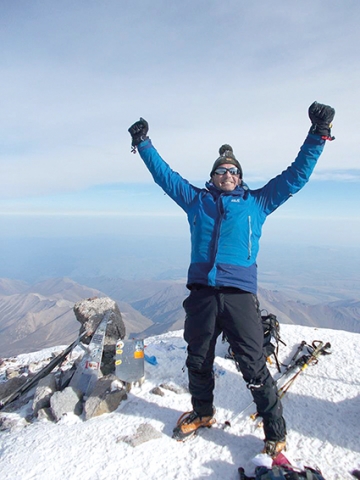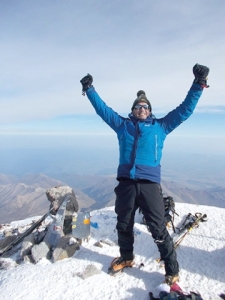Inspiring Irish Climber Tackles His Highest Mountain Yet - Elbrus
Fergal Hingerty lives in a small Irish town. He had a career in credit control and an active, athletic lifestyle in Dublin, until one day his legs began causing him trouble. In 2001, he was diagnosed with a severe case of chronic sciatica, which continued to worsen to the point that standing for more than two minutes at a time was nearly impossible. His spine was deteriorating. He moved out of Dublin when it became too difficult to walk through crowded city streets, which required constantly shifting his weight to avoid cars, people and potholes.
After countless medical consultations, therapies, and treatments, a doctor finally proposed surgery. The operation presented a 20% risk of landing him in a wheelchair, but compared to the near 100% chance of being wheelchair-bound within a year without the surgery, Hingerty took the risk. The operation was a rousing success. Recovery was a painful struggle in and of itself. Hingerty calls it “some sort of miracle” that he is now not only walking, but climbing mountains.
“The rehab, the weights, the swimming, the stretches...it was physically, mentally, and emotionally tough,” he recalled. After his operation in March 2011, he began taking long walks around the canals in his town to strengthen his muscles. Just four months after the surgery, a friend invited him to go hiking with her in the mountains, and his doctor gave him the green light. “I never had an interest in climbing before,” he explained, but “I had a choice. I could walk around the park 1,000 times or I could take on a challenge.” Hingerty rarely hikes the same hill twice. “I enjoy the planning and analyzing of a route, the challenge of figuring out how to get up and down, using maps and compasses…it’s much harder to [hike without a GPS], but much more satisfying when you do it,” he enthused. He is fascinated with the idea of navigating based on nature – the sky, the sun, the wind, observing where ivy and moss grows.
Hingerty became the first person to climb all the county tops (the highest point in each county) in Ireland and Wales, and is working on Scotland, but he cut his high-altitude teeth in Georgia, hiking for several days in Svaneti with technical equipment in 2015, and summitting Mt. Kazbek last fall.
He does feel “a bit” of pressure to be inspiring, to be a role models for others. “Mountain climbing helps release me from the material world,” he said, bringing him more in touch with the universal truths of life. He does interviews and writes articles about his climbing in the hope that he can reach people who might be heartened by his story. If his message of never giving up touches someone, “you can only feel good about that...there’s a sense of fulfillment,” he said. His philosophy is that “It’s not really about leaving behind a legacy. I’ve always emphasized there are people far worse off than me who have overcome more than me…I’ve been given a second chance, therefore it’s incumbent upon me to do something...you can’t be selfish.”
Hingerty’s most recent target was also his highest – Mt. Elbrus, the highest mountain in Europe. He went with a trekking company called Mountain Freaks, a Polish outfit based out of Kazbegi, Georgia. They left Tbilisi Saturday morning to drive to base camp. After a few small climbs to acclimate, they made a summit push on August 31, and succeeded on their first attempt. How does Hingerty feel about climbing in Russia? He says the political borders around the peaks are just “a complicated coincidence.” He isn’t hiking for the culture or history of a place, but for the geography itself.
Elbrus may be his highest, he told me before the climb. He pulled out a postcard with a picture of one of Georgia’s most intimidating peaks, Ushba in Svaneti, deadly for its complexity and steepness rather than its height. “I’m not going to climb that one,” he laughed.
Elbrus is a dangerous mountain as well. On average, the mountain takes 15-30 lives per year. Hingerty dismissed any fear, though, saying they were probably “drunk idiots, skiers, poor guys…” he trails off. He attributes his confidence to his faith in Mountain Freaks’ experience and professionalism, and his focus on safety and preparation – “just because you love the mountains doesn’t mean the mountains love you.”
“If I don’t summit this year, I’ll go back next year...I would feel disappointed. I wouldn’t say devasted. The number one issue on mountains is safety,” he repeats, “it is pointless to try to climb by pushing it too far. Every single climber has tried to push too far and has learned a lesson from it.” He recognizes that every climb has a key decision point – to keep going or turn back. Hingerty has plenty of practice making those tough decisions hiking in the volatile climates of Ireland and Britain. “At the time, you might be annoyed if you have to come down for some reason, but you’ll look back and understand it was the right thing,” he insists.
Hingerty and his team summitted Mt. Elbrus successfully on August 31. “I never had a doubt about getting to the top,” he said afterwards, despite battling nausea, the extreme altitude, and the biting cold. He asserts that the most important element of the group’s success was their preparation. It was so “important [that] we prepared properly, thanks to the professionalism of [guide] Ewa and Mountain Freaks...still,” Hingerty said, “some of the group suffered...This is a very cold, high, and dangerous mountain. Do not gamble with your life – climb it properly and only with professionals.”
Hingerty is not shy about sharing his thoughts on the negative side of Georgia’s mountains. In his 2015 commentary on Svaneti, published in GEORGIA TODAY, he wrote “there exist two issues which have to be tackled. Firstly, the litter which appears along parts of the hiking routes used both by locals and some hikers, which could turn into a big problem unless dealt with soon. However, by far the biggest problem is the insane driving culture whereby white lines do not exist... And…the added problem of wandering livestock everywhere.” In an interview with GEORGIA TODAY before climbing Mt. Kazbek he mused, “If you can carry a full bottle of water up the mountain, surely you can carry an empty bottle down.”
In our conversation before his trek to Elbrus, Hingerty criticized what he views as Georgia’s over-commercialization. He worries that Georgia is selling its soul to the tourism industry. It’s the eternal question – what is authenticity, and how to maintain the balance between the charm tourists demand, carefully curated to look untouched, and the economic development and prosperity of local people? Hingerty insists that Georgia must be both cleaned up and left wild, the edges polished, but not too much...a tricky proposition. On his fifth trip to the country, however, he is still full of love for the warm hospitality he has repeatedly received and, of course, Georgian wine. “I have come back because I found Svaneti exhilarating, I found Tusheti absolutely incredible, Kazbek itself was incredible – the people, the relaxed vibe,” are constant draws.
When asked if he had the urge to keep climbing, and to go even higher, Hingerty said “at the moment, no, like last year [after I climbed Mt. Kazbek], but by Christmas that old itch will come back, I’m sure.”
By Samantha Guthrie
Related stories
Not without a Fight: Ireland-Svaneti
The Sky’s the Limit: The Amazing Quest of Fergal Hingerty
Fergal Reaches New Heights in Kazbegi, Just 6 Years after a Major Back Op












